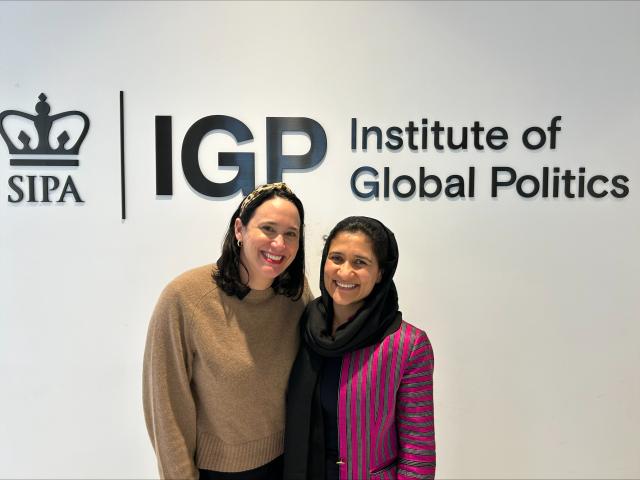
Shabana Basij-Rasikh Discusses the Power of Education for Afghan Girls

Educated girls — and the educated women they become — are the ones who lift societies to healthier, wealthier, more equitable and peaceful places. That’s the guiding principle behind the School of Leadership, Afghanistan, or SOLA, which Shabana Basij-Rasikh cofounded and serves as president.
Investing in girls’ education also provides an impressive rate of return if one looks at it simply from a cost-benefit perspective, says Basij-Rasikh, who is also an IGP Inaugural Carnegie Distinguished Fellow.
Her remarks came at a February 28 workshop on the status of women and girls in Afghanistan. Serving as moderator was Phoebe Donnelly, an adjunct assistant professor at SIPA and IGP affiliated faculty member who is a senior fellow at the International Peace Institute, where she leads the Women, Peace and Security (WPS) program.
Shortly after the Taliban returned to power in 2021, secondary school education for girls was banned throughout the country, forcing Basij-Rasikh to pick up and move her school from Kabul to Rwanda.
“Four days after relocating, we resumed classes,” she said. “Even knowing our sisters back in Afghanistan — former classmates, neighbors’ daughters, and even blood sisters — cannot go to school. As you can imagine, we’ve never had to ask them to study hard.”
During the discussion, Basij-Rasikh was asked about the current status of girls and women in a Taliban-controlled Afghanistan, the threat of terrorism, and the role men can play in the battle for education justice for girls.
“The students who left Afghanistan,” she said, “with the exceptions of the few whose families managed to flee… that was the last time they saw their family.”
When given the choice to continue their education or stay in Afghanistan, students at SOLA chose to continue their education.... When the time comes for women in Afghanistan to safely return to work, I know, for a fact, they are going to be leaders.
— Shabana Basij-Rasikh
“When given the choice to continue their education or stay,” Basij-Rasikh added, “they chose to continue their education. We are talking about girls as young as 10 years old. They may not be able to go back, but I want them to become the most highly educated people in the world.”
Although Basij-Rasikh attended college overseas, her family persuaded her to return to Afghanistan because that is where she could make the biggest difference. “It’s a very dark time in Afghanistan,” she said, solemnly. “The rights of so many people — they’re all just completely missing.”
She acknowledges that the Taliban are to blame for the lack of secondary school education but points out that the patriarchal culture within the country is also partly to blame. “Remove the Taliban today, and girls’ access to education is not magically solved,” she noted. “In the 20 years between the Taliban’s [periods of] rule, almost 70 percent of girls were still not enrolled [in schools].”
As the first and only boarding school for Afghan girls, SOLA and its model for education found both supporters and detractors among officials in Kabul. In 2023, the school received around 2,000 applications, its highest number ever by a large margin; a spokesman told SIPA News that school officials expect a similar level of interest this year.
“I want a SOLA student to be able to answer the question: How did I get here, physically and otherwise? Why am I, as an Afghan girl, having to do everything that I do to attend school? I want them to understand it, so they don’t shy away from what’s happening in Afghanistan. They need to understand it so they can face it. When they face it, they can work with it,” Basij-Rasikh said.
“When the time comes for women in Afghanistan to safely return to work, I know for a fact [that SOLA graduates] are going to be leaders.”